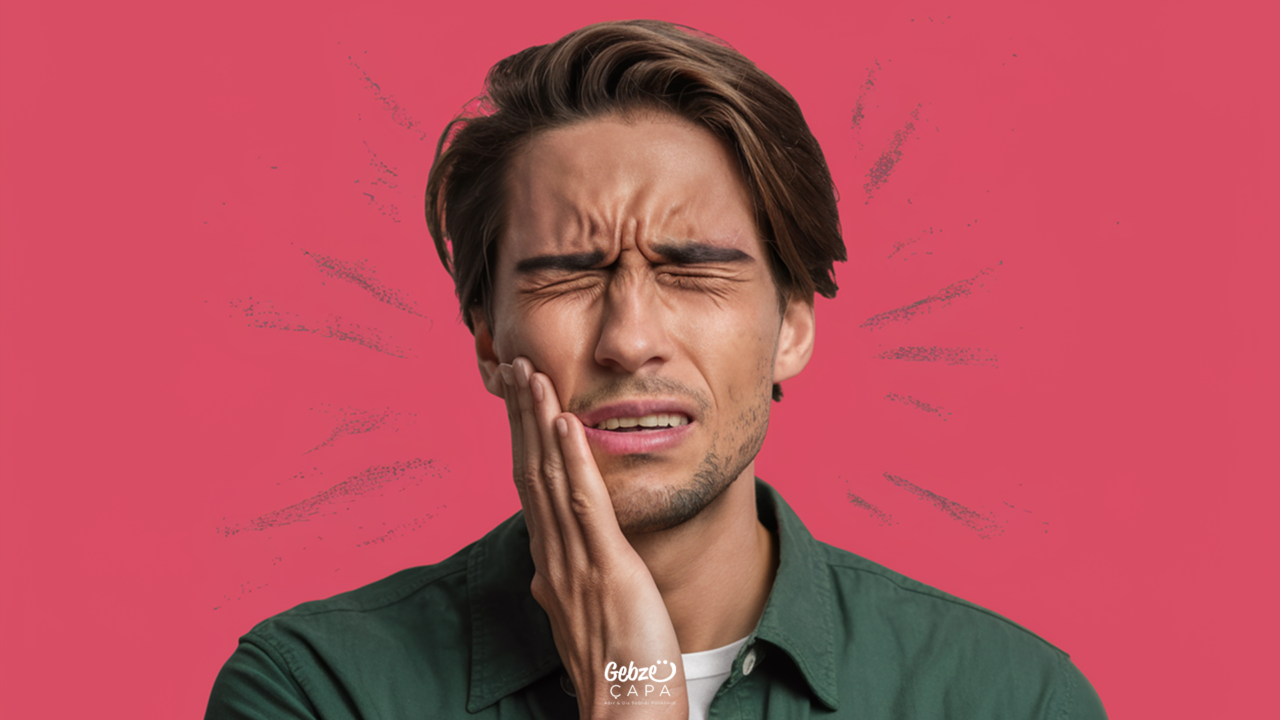What is Bruxism
Bruxism is the habit of individuals unknowingly clenching, grinding or clenching their teeth during sleep or during the day. This condition can negatively affect oral health and cause serious disorders in the jaw and facial muscles. Although bruxism is generally associated with psychological factors such as stress and anxiety, there may be many different underlying causes.
The effects of bruxism are not limited to wear and fractures of the teeth. Long-term teeth clenching and grinding can cause overload on the jaw joints, leading to temporomandibular joint (TMJ) disorders. In addition, a constant feeling of tension in the jaw and facial muscles, muscle aches and headaches are among the common symptoms of bruxism. These disorders can reduce quality of life over time and negatively affect daily activities.
What Causes Bruxism?
It is not possible to give a definitive answer as to why bruxism occurs. Although the causes are not fully known, various factors are thought to trigger this condition. Here are the possible causes of bruxism:
- Stress and Anxiety: Stress and anxiety experienced in daily life are one of the most common causes of bruxism. Situations such as busy work schedule, family problems or economic difficulties may increase the habit of teeth grinding in individuals. Stress causes muscle tension as a natural response of the body, which can lead to unwitting teeth grinding during sleep. Anxiety and anxiety experienced during the day may cause unconscious teeth clenching. Especially during stressful periods, bruxism symptoms may increase. Therefore, stress management and relaxation techniques play an important role in the treatment of bruxism.
- Sleep Disorders: Sleep apnea, snoring, or other sleep disorders may increase the risk of bruxism. Situations such as not being able to breathe comfortably during sleep or waking up frequently may trigger the tendency to clench and grind teeth. Sleep apnea is when a person’s breathing stops for short periods of time during sleep, and this can trigger the body’s self-defense mechanism and lead to teeth grinding. Impairment of sleep quality causes the body to not be able to fully rest, which paves the way for bruxism. Treating sleep disorders may be effective in reducing bruxism symptoms.
- Jaw and Teeth Problems: Alignment problems in the teeth or disorders in the jaw structure can lead to bruxism. Additionally, missing or misplaced dental fillings can also trigger this condition. Failure to close the teeth properly can cause excessive strain on the jaw muscles and trigger the habit of teeth clenching. Orthodontic problems or structural disorders in the teeth can cause imbalances in the jaw joint and trigger bruxism. By detecting such structural problems, dentists can recommend appropriate treatment methods and thus alleviate the symptoms of bruxism.
- Genetic Factors: Individuals with a family history of bruxism are more likely to experience this condition. Genetic predisposition may play a role in the emergence of bruxism. Genetic factors may have an impact on individuals’ jaw structure and muscle functions, which may increase the tendency to bruxism. Experiencing similar problems in family members may be an indication of a genetic predisposition. Therefore, treatment and preventive methods should be developed by taking genetic factors into account.
- Tobacco and Alcohol Use: Smoking and excessive alcohol consumption may increase the risk of bruxism. These substances may disrupt sleep patterns and trigger the habit of teeth grinding. Smoking causes nicotine levels to increase in the body, which stimulates the nervous system. Alcohol depresses the central nervous system and leads to decreased muscle control during sleep. Both conditions can cause unconscious clenching and grinding of the teeth. Reducing or completely stopping tobacco and alcohol use may help reduce bruxism symptoms.
- Medication Side Effects: Some antidepressants and psychiatric medications can cause bruxism as a side effect. Teeth clenching and grinding are frequently observed in individuals using such medications. Psychotropic medications can affect the nervous system, reducing muscle control, which can lead to bruxism. Antidepressants and some anxiolytics can increase muscle tension in the body, which can trigger a tendency to clench teeth. When bruxism develops due to medication use, this situation may need to be evaluated with doctors and, if necessary, the medication dose may need to be adjusted or alternative treatment methods may need to be tried.

Bruxism Symptoms
Bruxism symptoms may vary from individual to individual. However, commonly observed symptoms include:
- Tooth Sensitivity: Bruxism can cause wear on tooth enamel and therefore tooth sensitivity. Pain and sensitivity may be felt in the teeth when hot, cold or sweet foods are consumed.
- Jaw Pain and Stiffness: Clenching and grinding teeth causes the jaw muscles to work excessively, creating a feeling of pain and stiffness. When you wake up in the morning, you may feel pain and fatigue in your jaw.
- Headache: Bruxism can cause severe headaches. These headaches, which are usually felt in the morning, can be confused with tension-type headaches.
- Tooth Wear and Fractures: Constant teeth clenching can lead to wear and even fractures of the teeth. This can cause changes in the shape and size of the teeth.
- Earache: Bruxism can cause pain in the ear area. These pains usually occur as a result of tension in the muscles around the jaw joint.
- Sleep Problems: Bruxism can negatively affect sleep quality. Constant clenching and grinding of teeth can lead to interrupted sleep and the feeling of not being able to wake up rested.
Treatment of Bruxism
Bruxism treatment varies depending on the underlying causes and severity of symptoms. Here are the treatment methods for bruxism:
- Stress Management: Considering that stress and anxiety contribute to bruxism, stress management techniques become important. Meditation, yoga, deep breathing exercises and professional support can be effective in reducing stress.
- Night Plates: Specially designed by dentists, night plates reduce wear by preventing teeth from touching each other. These plates prevent teeth clenching and grinding during sleep.
- Dental Treatments: If there are alignment problems or missing teeth, these problems should be corrected by the dentist. Dental fillings or orthodontic treatments may be effective in reducing bruxism.
- Medication: In some cases, muscle relaxants or antidepressants may be prescribed to reduce the severity of bruxism. However, drug therapy should generally be viewed as a temporary solution.
- Physiotherapy: Physiotherapy exercises may be recommended to relax and strengthen the jaw muscles. These exercises can relieve pain by reducing tension in the jaw muscles.
- Behavior Change: It is important for individuals to become aware of their teeth clenching and grinding habits and to change these habits. For this purpose, individuals may need to consciously relax their jaw muscles and be careful not to clench their teeth.

Bruxism Exercises
Bruxism, the habit of clenching and grinding teeth, can cause tension and pain in the jaw and facial muscles. You can do bruxism exercises to alleviate this condition. Here are some effective exercises that can help reduce bruxism symptoms:
Jaw Relaxation Exercise
This exercise is a great way to relax your jaw muscles.
- Step 1: Sit or stand in a comfortable position.
- Step 2: Separate your teeth, keeping your lips closed.
- Step 3: Place your tongue behind your upper teeth, towards your palate.
- Step 4: Move your jaw up and down slowly, but do not touch your teeth.
You can do this exercise several times a day, especially when you feel tension in your jaw.
Exercise to Strengthen Jaw Muscles
Strengthening the jaw muscles may help reduce bruxism symptoms.
- Step 1: Open your mouth wide.
- Step 2: Place your palms under your jawbone and apply slight resistance as you slowly close.
- Step 3: Stay in this position for 5 seconds and then close your jaw completely.
You can repeat this exercise 5-10 times a day.
Language Exercise
Tongue exercises can be effective for relaxing your jaw muscles and relieving tension.
- Step 1: Place your tongue behind your upper teeth, towards your palate.
- Step 2: Slowly open and close your mouth while keeping your tongue on the roof of your mouth.
- Step 3: Repeat this movement 10 times.
Cheek Massage
Cheek massage is a great way to relax jaw and facial muscles.
Step 1: Use your fingertips to place them on the tops of your cheeks, close to your jaw joint.
Step 2: Gently massage in circular motions.
Step 3: Apply this massage for 2-3 minutes on both cheeks.



